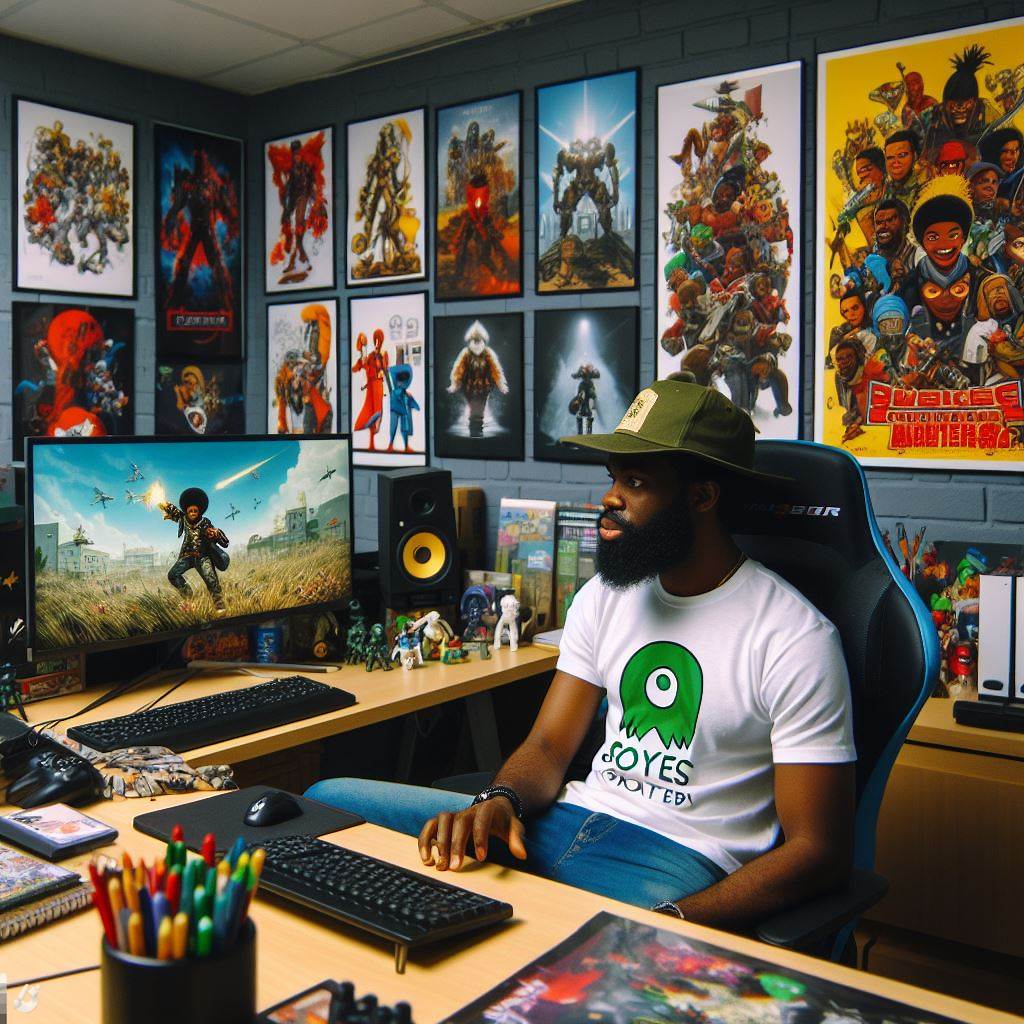Introduction
Gaming development refers to the process of creating and designing video games for various platforms. It involves programming, artwork, and sound design.
Gaming development began in the early 1960s with the introduction of computer games like Spacewar!
The importance of gaming development has grown significantly over the years. With the advancement of technology, games have become more immersive and engaging.
Nigeria has seen a rise in the popularity of gaming development, with several studios and developers emerging.
The growth of gaming development in Nigeria can be attributed to factors such as increased access to technology and the rise of mobile gaming.
The country’s youth population and their enthusiasm for gaming have also contributed to its growth.
Nigeria’s gaming industry has attracted attention globally, with local developers creating successful games and gaining international recognition.
The gaming development industry in Nigeria has opened up opportunities for aspiring game developers, creating jobs and contributing to the country’s economy.
It has also provided a platform for showcasing Nigerian culture and storytelling through games.
Additionally, gaming development has fostered creativity and innovation within the country’s tech industry.
Therefore, gaming development involves creating and designing video games and has seen significant growth in Nigeria.
It is an important industry that provides economic opportunities, showcases Nigerian culture, and fosters innovation.
With the continued advancement of technology, the future of gaming development looks promising in Nigeria.
Key components of gaming development
Key components of gaming development include
- Game design
- Conceptualization
- Storytelling
- Game mechanics
- Game programming
- Choice of programming languages
- Algorithms and logic
- Integration of audio and visuals
- Game art and animation
- Character design
- Environment and level design
- 2D and 3D animation techniques
- Game testing and quality assurance
- Bug detection and fixing
- User experience testing
- Balancing and refining gameplay
Game development involves crucial components like game design, programming, art, animation, testing, and quality assurance.
Designers shape the game’s vision, mechanics, and storytelling. Programmers use languages, algorithms, and logic to implement mechanics and integrate audio-visual elements.
Art and animation bring characters and environments to life with unique traits and immersive worlds.
Testing and quality assurance detect bugs, ensure smooth gameplay, and gather user feedback for improvement.
Balancing gameplay is crucial for an enjoyable yet challenging experience. Understanding and harnessing these components leads to successful games that resonate with players.
Basically, gaming development comprises various key components that contribute to the overall success of a game.
From game design and programming to art and animation, each component plays a vital role in creating an engaging and immersive gaming experience.
Additionally, game testing and quality assurance ensure that the game runs smoothly and provides an enjoyable experience for players.
By understanding and harnessing these key components, game developers can create captivating and successful games that resonate with players.
Read: Effective Remote Work Skills
Popular Gaming Genres and Trends
In gaming development, popular genres and trends capture global attention:
- Action Games: Intense gameplay and adrenaline-pumping sequences define these games.
- Shooter Games: Players eliminate enemies with a variety of weapons, making this genre highly popular.
- Fighting Games: Focus on one-on-one combat, where players use martial arts techniques strategically.
- Platform Games: Navigating platforms, overcoming obstacles, and facing enemies characterize this genre.
- Simulation and Strategy Games: Emphasis on strategic thinking and decision-making, simulating real-life situations.
- Role-Playing Games (RPGs): Players assume a character’s role, embarking on quests in vast, immersive worlds.
- Strategy Games: Outsmart opponents through strategic planning and calculated decisions.
- Simulation Games: Recreate real-life experiences, simulating activities like running a business or controlling a city.
- Sports and Racing Games: Include popular sports like football, basketball, tennis, and high-speed car racing.
- Football Games: Players control their favorite teams, engaging in realistic virtual matches.
- Car Racing Games: Provide the thrill of high-speed races, allowing competition against AI or other players.
- Other Sports-Based Games: Include basketball, golf, baseball, and more.
- Online Multiplayer Games: Enable players to connect and play together in virtual worlds.
- Massive Multiplayer Online Games (MMOs): Thousands of players interact simultaneously in persistent virtual worlds.
- Battle Royale Games: Players compete to be the last one standing on a shrinking battlefield.
- Cooperative Games: Emphasize teamwork, requiring collaboration to achieve common objectives.
Emerging Trends In Game Development
As gaming development continues to evolve, new trends and technologies are constantly emerging, providing gamers with unique experiences.
- Augmented reality (AR) games: AR games superimpose virtual elements onto the real world, allowing players to interact with their surroundings in innovative ways.
- Virtual reality (VR) games: VR games offer immersive experiences by transporting players into virtual worlds, where they can interact with objects and characters.
- Mobile gaming: With the rise of smartphones, mobile gaming has become increasingly popular, allowing gamers to play on the go.
These popular gaming genres and emerging trends in development showcase the ever-evolving nature of the gaming industry.
Whether it’s the high-octane action of shooter games or the immersive experiences offered by VR, there is a genre to suit every player’s preferences.
As technology continues to advance, we can expect even more exciting developments in the world of gaming.
Read: Personal Branding for Success
Gaming Development Process
- Idea Generation and Concept Development: During this stage, game developers brainstorm ideas and develop a concept for their game.
- Pre-production Phase: In the pre-production phase, various tasks are undertaken to prepare for the actual game development.
- Game Design Document (GDD): A detailed document is created that outlines the game’s concept, mechanics, levels, and art style.
- Character and Environment Design: Artists and designers work together to create the characters and environments for the game.
- Prototype Development: A small-scale version of the game is built to test out the mechanics and features.
- Production Phase: Once the pre-production phase is complete, the game moves into full production.
- Coding and Programming: Programmers write the code that brings the game to life, implementing the mechanics and features.
- Art and Animation Creation: Artists create the graphics and animations that will be seen in the game.
- Audio Integration: Sound designers and composers work on creating the music and sound effects for the game.
- Testing and Quality Assurance Phase: During this phase, the game is extensively tested to detect and fix any bugs or issues.
- Launch and Post-production Phase: After the game is fully developed and tested, it is ready to be launched to the public.
- Marketing and Promotion: Efforts are made to market and promote the game, including creating trailers and reaching out to influencers.
- Player Feedback and Updates: Developers gather feedback from players and make updates to improve the game’s performance and experience.
Read: Freelance Writing: Tips & Tricks

Opportunities in gaming development in Nigeria
Opportunities in gaming development are on the rise in Nigeria. The country’s game development industry is growing rapidly, with an increasing number of companies and studios emerging in recent years.
Personalized Financial Consulting – Tailored for You
Get a custom financial plan made just for you in 1-3 days. Clear strategies, actionable steps, and unlimited revisions.
Get StartedGame development companies and studios
Game development companies and studios in Nigeria are creating exciting opportunities for developers to work on various projects.
These companies offer employment opportunities for individuals interested in designing, coding, and creating games.
The opportunities in gaming development in Nigeria are vast, and with the right skills and determination, individuals can carve out successful careers in this dynamic and exciting industry.
Freelancing and remote work possibilities
Freelancing and remote work possibilities in gaming development are also becoming more prevalent in Nigeria.
Many developers are opting to work independently or remotely, allowing them to have flexible working hours and the freedom to choose their projects.
Freelancing and remote work possibilities provide flexibility, while esports and competitive gaming create avenues for gamers to turn their passion into a profession.
Esports and competitive gaming
Esports and competitive gaming have gained significant popularity in Nigeria, creating opportunities for gamers to participate in tournaments and even turn professional.
The rise of esports has paved the way for the growth of gaming development, as developers are needed to create and maintain gaming platforms and infrastructure for competitive play.
Game publishing and distribution
Game publishing and distribution offer new opportunities for developers in Nigeria’s growing gaming industry. With more game development studios emerging, the demand for publishers is rising.
These publishers play a key role in marketing, licensing, and distributing games, providing developers with chances to explore various industry aspects.
This includes marketing strategy, licensing agreements, and game distribution channels. Developers can showcase not only technical skills but also delve into business and marketing.
The collaboration between developers and publishers creates a symbiotic relationship, offering insights into market trends.
Game localization and translation
Game localization and translation are vital in reaching a broader audience in Nigeria.
Many gamers prefer to play games in their local language, and developers are needed to adapt and translate games into different Nigerian languages.
This is a niche market that presents unique opportunities for developers to expand their skills and cater to a diverse audience.
In summary, there are numerous opportunities for gaming development in Nigeria.
The industry’s growth has led to the emergence of game development companies and studios, offering employment prospects for developers.
Additionally, game publishing and distribution, as well as game localization and translation, further contribute to the thriving gaming development industry in Nigeria.
To capitalize on these opportunities, aspiring developers need to hone their skills. Continuous learning and staying updated with the latest trends in gaming development are crucial.
Networking with professionals, engaging in game development communities, and attending workshops and conferences can enhance knowledge.
It also increases the chances of securing rewarding positions in this field.
Whether it’s working for a game development company, freelancing, or exploring esports, the options are endless for those passionate about creating immersive gaming experiences.
Read: Web Design: Trends in Nigeria
Conclusion
In the end, this blog post aimed to provide an introduction to gaming development, highlighting its potential and growth in Nigeria.
Throughout the post, we highlighted key points: the rising popularity of gaming in the country and the benefits of gaming development.
Additionally, we explored the opportunities it presents for both individuals and the industry as a whole.
By exploring gaming development, individuals in Nigeria can tap into a thriving market and unleash their creativity in designing captivating games.
Additionally, the industry offers exciting career prospects and the chance to contribute to the country’s economic growth.
Gaming development has a bright future in Nigeria. With technological advancements and an increasing number of gamers, the demand for innovative and immersive games is expected to grow rapidly.
This presents a unique opportunity for developers to showcase their skills and create experiences that resonate with Nigerian gamers.
Basically, we encourage individuals in Nigeria to explore the exciting world of gaming development.
By embracing this field, they can contribute to the growth of the industry while satisfying the growing demand for captivating and culturally relevant games.
Unlock Your Path to Financial Freedom
Personalized savings and investment strategies tailored to your financial goals. Let's help you take control of your future with a plan designed just for you.
Get StartedSo, what are you waiting for? Dive into gaming development and be a part of the flourishing gaming industry in Nigeria!




